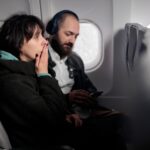Claustrophobia is a type of anxiety disorder characterized by an intense and irrational fear of enclosed places. It affects around 12.5% of the population. People with claustrophobia may experience symptoms of intense anxiety in closed places such as buses, trains, tunnels, aeroplanes or any other closed place that makes them feel trapped or uncomfortable.
Air travel can be a difficult experience for someone with claustrophobia as aeroplane cabins are often very small, with limited room to move and passengers are seated nearby as well. All these factors can trigger the sense of being trapped and cause anxiety for someone with claustrophobia. However, there are a few ways one can manage or avoid feelings or symptoms of claustrophobia on flights. They are:
-
Choose the Right Seat
Picking the right seat while flying can help manage the symptoms of claustrophobia. It is advisable to choose an aisle seat as it will give you more space to move around which can help you avoid feeling trapped. You can also choose a seat that gives you more legroom if possible
-
Know Your Flight
Consider learning about your flight from the cabin crew before you board your plane. Familiarity with the plane layout and surroundings can help reduce feelings of uncertainty.
-
Keep the Crew Informed
Let the cabin crew know of your claustrophobia symptoms and ask them how they can help in case you start feeling uncomfortable during your journey. You can also consider letting your fellow passengers know about your condition so that they can help you out.
-
Pay Attention To Your Diet
Consuming alcohol or caffeine can cause your heart to race, increasing the feelings of anxiety. Thus, it is advisable to avoid these substances during your flight journey.
-
Travel With Someone
Consider travelling with a trusted friend, colleague or family member so that they can provide you with emotional support on the flight.
-
Pack Plenty of Distractions
Sometimes distraction can be an effective way to cope with claustrophobia. So make sure you carry things that help you take your mind off anxious feelings. You can use anything that helps you distract yourself, like reading books, listening to music, solving a puzzle, gaming on the phone, or watching a movie. However, avoid watching movies that might trigger feelings of fear or anxiety.
-
Practice Breathing Techniques
Whenever someone feels anxious or claustrophobic, their heart rate starts to rise. In such situations, mindfully practising deep breathing techniques can help bring a sense of calm to your body.
-
Visualisation
Visualization is an effective way to distract the mind from anxious thoughts and focus on something calming. You can close your eyes and visualize a recent positive experience, In the days leading up to your flight you can also visualize yourself having a calm and pleasant flight experience. Practising this regularly may help you be less anxious on your next flight.
-
Visit your Doctor or Therapist
Consider visiting your doctor or therapist before your flight. While a doctor might be able to prescribe medication if required, a therapist can help you work through feelings of fear and provide you with resources to cope during your flight.
Conclusion:
Flying with claustrophobia can be a distressing experience. However, it is possible to manage symptoms of claustrophobia during a flight journey. You can consider informing the cabin crew of your condition while also practicing breathing, distraction, visualizations, etc to manage your symptoms. If you see claustrophobia as a significant interference in your flying experience, consider visiting a therapist as soon as possible.
References:
- Aerophobia (Fear of Flying): Causes, Symptoms & Treatment. (n.d.). Cleveland Clinic. Retrieved December 14, 2023, from https://my.clevelandclinic.org/health/diseases/22431-aerophobia-fear-of-flying
- How to Control Panic Attacks While on an Airplane. (n.d.). Verywell Mind. Retrieved December 14, 2023, from https://www.verywellmind.com/managing-panic-attacks-while-flying-2584150
- How to Cope on a Long Trip When You Have Claustrophobia. (n.d.). Verywell Mind. Retrieved December 14, 2023, from https://www.verywellmind.com/traveling-with-claustrophobia-2671699
- McInnis, K. (2022, March 18). What you can do to help overcome a fear of flying, according to experts. CNN Underscored. https://www.cnn.com/cnn-underscored/travel/get-over-fear-of-flying

